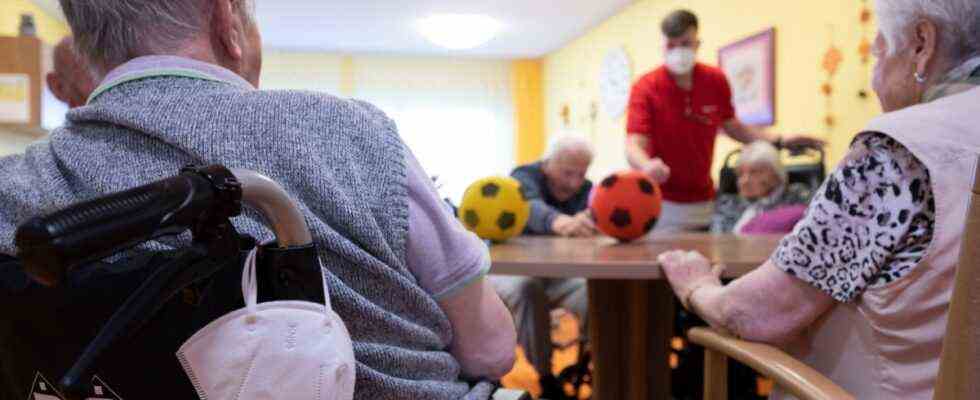The tests exhaust us to such an extent that it is madness. My employees work hard, it takes an incredible amount of strength and energy, “reports Lydia Wörlein, facility manager at the Awo senior citizen center in Kirchseeon, whose total exhaustion is almost palpable at 8:30 in the morning through the telephone receiver.
Your statement relates to the ordinance of the District Office, which has been in force since November 15, according to which the following now applies in the sixteen care and six disabled facilities in the Ebersberg district: All residents are tested three times a week, vaccinated or recovered employees or volunteers twice. Unvaccinated personnel must have a rapid test every day they enter the facility. In the case of external persons, regardless of whether they are relatives, craftsmen or service providers, the vaccination status is again irrelevant; they must always present a test, whereby the rapid test is valid for a maximum of 24 hours and the PCR test for 48 hours. Supervised on-site tests are also permitted where this is possible with trained personnel and suitable equipment.
The implementation of these regulations is a huge effort, both in terms of time and personnel. At the same time, in view of the current developments, the institutions surveyed are fully behind the protective measures, although an average of 98 percent of residents have been vaccinated at least twice and most of them have already received a booster. In terms of staff, the quota ranges from “a good 60 percent” in the Glonner Marienheim and 70 percent in the Maria Linden house in Vaterstetten to 95 percent in the Bartholomäus house in Zorneding and in the Kirchseeon Awo senior center. According to head Wörlein, the remaining five percent were advised against vaccination due to previous illnesses. The Reischlhof in Ebersberg has a 100 percent vaccination rate.
There, as in Vaterstetten and Zorneding, the vaccinated employees had been voluntarily tested on a regular basis since June 2020, long before the current regulation, as facility manager Anke Möglinger explains. Nevertheless, she goes “to work every day with a stomach ache” because you always have to expect something to happen. In addition to this constant nervous stress, the time factor associated with the test is now added: “We needed a total of three hours for our 48 residents yesterday. That is a large amount of time that is expected of us and for which we have no extra staff.” Especially since you need great instinct for people with geriatric psychiatry or dementia who cannot cognitively understand the test.
In Haus Maria Linden, a facility for elderly people with intellectual disabilities or mental illness, 40 to 50 of the 80 employees are trained so that they can test themselves and others. It’s good. The current problem with the delivery of rapid tests is not good. “Fortunately, the health department, which I feel well supported by, provides me with some,” says head Michael Liebmann. The bureaucracy associated with Corona is taking a toll on him. He is also desperately looking for skilled workers. Like all.
Because you “wouldn’t be able to do the tests on your own”, Stefan Schmidt hired an external company and hired a student for a limited period. This means that the manager of Haus Bartholomäus can also offer visitors the opportunity to be tested on the spot during opening hours.
For Hubert Radan this remains an unfulfillable wish. The manager of the Glonn Marienheim is glad that he has someone to check the entry requirements at the door. Recently, for example, the 92-year-old husband of a resident had to stand in line for an hour and a half in a test center to receive it. Radan would like to spare people that. “We are looking for people from the medical or health sector for our reception service, but also for the tests, to whom we can offer a contract for two to three months.”
In Ebersberg, on the other hand, they rely on volunteers: In the Reischlhof, relatives can be shown their certificates at the weekend. For these relatives, who have often been vaccinated expressly for the benefit of their spouses, mothers, fathers, and siblings, manager Möglinger wishes that they would be rewarded more and not all lump together. “Why don’t unvaccinated visitors need a PCR test? You can’t go to the cinema without it, but you can go to the nursing home.”
As a result of the measures, some institutions have reduced their visiting hours, others ask families to limit themselves to one or two important caregivers. “You can then see the grandchildren and son-in-law on the tablet via Facetime,” says Schmidt. Nevertheless, like everyone else, he regrets the restriction of social life and the lack of mixing, which means that instead of one “more like five Christmas parties” one has to hold areas in the large hall. That is why the man, who, as he says, was concerned with educational work from the start and who tests himself every day before work, explicitly appeals to everyone: “Get vaccinated, get vaccinated at last!”
But one thing is clear: Although the employees in the homes are exhausted and exhausted due to the implementation of constantly changing regulations, the continuous wearing of FFP2 masks and the resulting difficult communication, also with colleagues, the staff stands together and especially where there is a “long-term, stable team” like in Kirchseeon. The same is true even for the residents who say, for example, in Zorneding: “We have been through far worse things than such a small stick in our nose!”

